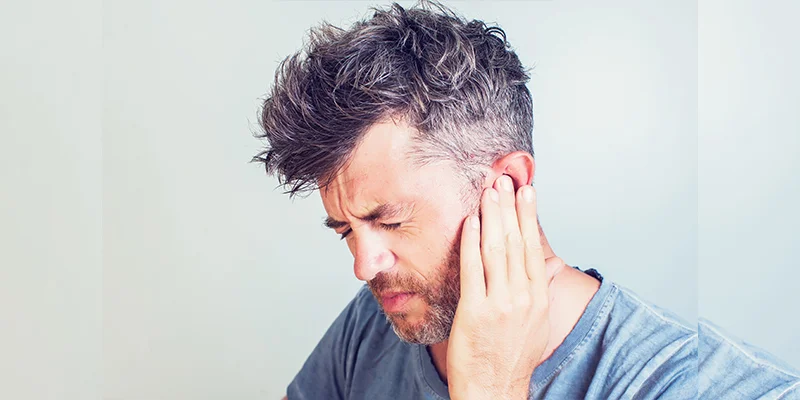Ear Pain- What Is the Underlying Cause?
Have you been experiencing ear pain?
Ear pain is a common problem that affects not only children but adults too. Ear pain can be caused by a number of things, including infections, allergies, and even sinus pressure. Although, there are many over-the-counter treatments available, it’s important to understand the underlying cause of your ear pain before self-medication.
So if you’re looking for a safe and effective way to get rid of your ear pain, read on! This article will explore all you need to know about the underlying cause of ear pain, how to identify and get relief from it.
Common causes of ear pain
The pain can be caused by a variety of reasons, including an ear infection. It can also be caused by injury due to an accident that involves the head.
Some other causes of ear pain are not serious and will go away within a few days or weeks.
Ear infections in children are more common because their eustachian tubes in the ear are straight and small as compared to adults, and their immunity is not completely built, so kids are more prone to ear infections. A few reasons are:
- A build-up of fluid in the outer part of the ear, in kids, is called swimmer’s ear as dirty water goes inside the ear and results in infection
- Accumulation of wax in the outer part of the ear
- Allergy to pollen, pet dander, food, or chemicals such as perfume or hair dye
- Cold or throat infection
- Scratching inner ear with bud, dinger, or any other object
What are some more serious causes of ear pain?
Ear infections and ear pain in adults are also due to other reasons that can get more serious if not attended to urgently. Few are listed below:
- Dental abscess or infection in the teeth.
- Ruptured eardrum due to some trauma
- Sinus with a sore throat
- Arthritis of the jaw
- Barotrauma (altitude change pressure)
- Temporomandibular joint syndrome (TMJ)
- Ear pain with fever
- Swimmer’s ear
- Acute Otitis Media (AOM)
How to prevent ear pain?
- Do not insert foreign objects into the ear.
- Dry your ears properly after a bath or swimming or if you get wet in the rainy season.
- Avoid smoking or exposure to secondhand smoking.
- Do not add any oil or liquid inside the ear.
- In case of any itching consult the doctor for proper ear drops.
- While traveling by air, chewing gum will help release pressure inside the ear.
- Try to feed the child as sucking helps to reduce the pressure in the ear.
Remedies for ear pain
Heating pad: Lay your ear on a warm heating pad to check if you get relief.
Cool and warm compress: this is to try both cold and hot temperatures if one helps better than the other.
A pain reliever can be taken by adults and do not give to children.
Sleep upright to ease the pain till the time you visit the doctor.
Chew gum if you are in the area with a change in air pressure.
Try to massage with warm herbal oil to get some relief around the ear.
Ear pain treatment
There are many treatments for ear pain available. The most common treatments are over-the-counter medications and other home remedies such as iced compresses or warm compresses, herbal remedies, or medicated oil drops. Depending upon the kind of pain or infection, your doctor will prescribe one of the following treatment options:
Pain Relief: It helps to relieve pain and reduce fever.
Antibiotics: It won’t help in viral infection in the ear but if it is a bacterial infection, a complete course of antibiotics is given.
Drainage: If fluid remains in the ear for a long time, the ear infection can come back. In this case, the doctor performs a procedure known as a myringotomy, wherein a small hole is done in the eardrum to drain out the fluid, water, blood, or pus. A tube is put inside the middle ear so that liquid does not come back and the middle ear remains dry. It helps to reduce pain, improve hearing, and keep the ear clear of infections.
It is a simple surgery even for the children, where the small kids are performed while they are sleeping and is done in the hospital as the same day procedure.
When should you seek medical attention for ear pain?
See the doctor immediately, if any of the following symptoms are seen:
- Discharge of any blood or pus from the ear
- Dizziness, bad headache, or fever
- Swelling behind or around the ear
- If your face feels weak and you cannot move the muscles of the jaw
- Pain is not going away within 24 hours’ time
To wrap things up
There are a variety of potential causes of ear pain, and it is important to see a doctor to determine the underlying cause. In some cases, ear pain may be due to an infection or other condition that can be treated with medication. In other cases, there may be a more serious underlying condition causing the pain, such as damage to the eardrum. Regardless of the cause, it is important to seek medical attention if you experience persistent or severe ear pain.

